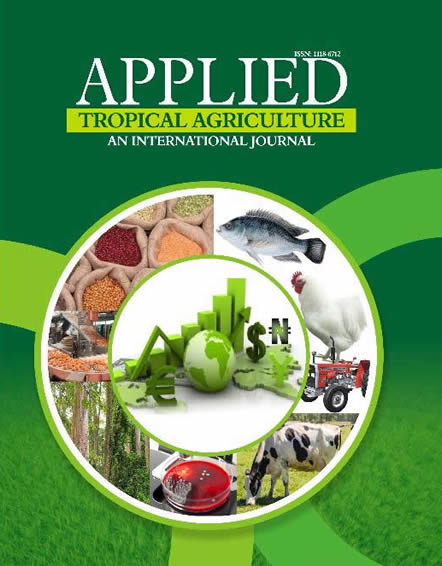Cowpea beetle (Callosobruchus maculatus (F.) and maize weevil (Sitophilus zeamais Mots.) are two serious insect pests of
stored grains in the tropics. Experiments were conducted at the Department of Crop, Soil and Pest Management, the
Federal University of Technology, Akure, Nigeria to determine the influence of food quantities and methods of sterilization
on the development of C. maculatus and to evaluate the effects of age and storage method on the performance of S. zeamais
under laboratory conditions. Results revealed significant differences (p<0.05) in the mean number of seeds with eggs,
seeds without eggs, seed weight loss and number of seeds with holes. However, no significant differences existed in mean
number of eggs laid and number of emerged adults though highest number of eggs was recorded for C. maculatus provided
with 20g of cowpea seeds. Investigations also revealed that methods of sterilization did not have significant effect on
number of eggs laid, number of emerged adults and number of seeds with eggs. However, methods of sterilization had
significant effect on number of seeds with eggs. Highest number of eggs was laid on and the lowest number of adults
emerged from seeds heat sterilized at 60°C and acclimatized for 3hrs. It was however observed that the weight of infested
cowpea seed reduced substantially with damage by the cowpea beetle. Results from the study also revealed that despite
non-significant effect (p>0.05) of insect age on the number of emerged adults at first month of maize storage, insect age
had significant effect on seed weight loss, with the highest weight loss value was obtained from grains infested with 3 days
old insects. Insect age did not have significant effect (p>0.05) on the number of adults that emerged and seed weight loss
when the seeds were stored for 2 months. Generally, 3 days old insects performed better than insects of other ages. Storage
materials did not have significant effect on the number of emerged adults and weight loss at both 1 and 2 months of maize
storage period. However, lowest number of adults emerged from grains stored in polythene bag while the lowest weight
was lost on grains stored in glass jar at 1st month of storage. Based on the results from this study, it was evident that food
quantity and method of sterilization could be among the factors that determine performance of C. maculatus in the
laboratory while age of infesting adults and storage material could influence the depredative capacity of the maize weevil
on maize during storage.
PAPER TITLE :RESPONSE OF COWPEA BEETLE TO FOOD QUANTITY AND METHODS OF STERILIZATION AND EFFECTS OF AGE AND STORA
APPLIED TROPICAL AGRICULTURE | VOLUME 21 NUMBER 3 2016
Paper Details
- Author(s) : Adebayo, R.A.
- Abstract:


